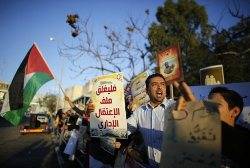Jailed Palestinian hunger striker faces death
14/02/2013| IslamWeb
"He is chasing death," Samer Issawi's sister, Shireen, says. "My brother is in serious danger."
Issawi, 33, has been on a hunger strike in an Israeli jail for more than 203 days. Initially released by Israeli authorities in an October 2011 prisoner swap, Issawi was re-arrested in July 2012 and told he would have to serve the remaining 20-years of his original sentence for allegedly violating the conditions of his release.
It is not officially known how prison authorities have kept him alive during months of not eating. Some of Issawi’s supporters said he was being force-fed through an intravenous tube, but the latest reports from prison indicate that he has begun refusing all nutrients and water and that he faces imminent death.
His sister said that Palestinian Prisoner Society lawyer Jawad Boulos, who represents Issawi, recounted that on a recent hospital visit that the hunger-striker told him: "I'm reaching the end of the tunnel. I'm either going to see the light of freedom or the light of martyrdom."
Issawi’s supporters say he has been held since July in administrative detention - which means he has not been formally charged with a crime. He either wants to be formally charged and given a fair trial, or released, and will continue his hunger strike until one of these things happens.
Disputed circumstances
The Israeli army did not respond to Al Jazeera’s requests for comment on the case, which has drawn significant international attention.
A spokesman for the Israeli army, however, told the Jerusalem Post newspaper that Issawi’s arrest was due to a violation of his release conditions. “The release of Samer Issawi stipulated that he would not commit any offense punishable by three months’ imprisonment or more, among other release conditions,” an official told the newspaper. “During 2012, he was convicted, according to his confession, of violating a legal order… The court has not yet reached a verdict in his case.” He was first arrested more than ten years ago for allegedly planning attacks against Israelis.
His sister said he was re-arrested in July while visiting a location near Hizma which is in the Jerusalem municipality, where he was allowed to be, and that he did not violate the terms of his release.
Rights groups said Issawi is one of several Palestinians to be re-arrested under dubious circumstances after they were released in the July 2011 prisoner swap, when 1,027 Palestinians were traded in phases of about 400 at a time for Israeli solider Gilad Shalit.
Daleen Elshaer, a Palestinian-American who organized the "Free Samer Issawi Campaign" told Al Jazeera that he "was not the only prisoner released in the swap who was re-arrested soon after".
Addameer, a Ramallah-based prisoners' rights group, says eight others were also re-arrested shortly after their release. "The wave of arrests reveals that the exchange deal has not deterred Israel's policy of detention," the group said. Hundreds of other Palestinians who were not involved with the swap were arrested in the months during the phased release, campaigners said.
In total, Addameer believes the number of Palestinians being held in Israeli prisons as of January 2013 is 4,743, including the 178 who are in administrative detention and are being held without charge or trial.
‘Beaten severely’
Issawi’s sister said she last saw her brother during a court appearance in December. "He weighed only 47kg… he was just skin and bones, he could barely even speak."
Because of the length of his hunger strike, Issawi suffers from a loss of vision, dizziness and loss of consciousness. He has lost control over his limbs and suffers severe pain all over his body - especially in his abdomen and kidneys, his sister said.
Issawi also suffers from fractured ribs that Shireen said were caused by an attack perpetrated by Israeli soldiers while he was handcuffed to his wheelchair at a December 2012 court hearing. "They beat him and they beat us. Then we were not allowed to see him at all," his sister said.
Issawi’s family say they have been subjected to collective punishment at the hands of Israeli authorities for drawing attention to the plight of their brother.
Shireen and another one of her brothers have been arrested, and Israeli soldiers regularly raid their neighborhood in what their family believes is an attempt to intimidate them.
Elshaer told Al Jazeera that the day Samer Issawi was beaten in court in front of his family, his sister was detained for 24 hours: "She was put on house arrest after that and her license to practice law was confiscated."
"The Israelis cut off the water to his parent's house, claiming they hadn't paid the bill," Elshaer said, adding that Israeli security forces demolished the home of Samer's brother Raafat in early January.
International attention
Danny Danon, a right-wing member of Israel’s Knesset, told the Jerusalem Post that officials should not listen to protests about the treatment of hunger strikers. "We do not need to listen to these efforts because they are terrorists," he said.
Palestinian activists, unsurprisingly, disagree. "The Israelis must charge him with a crime or set him free," Elshaer said.
"If he dies, there will be a big reaction… just the other day someone started a rumor online that Samer had died and Facebook and Twitter were going crazy. The reaction was quick. I think the public all over the world, not just Palestinians, will react to his death."
Malaka Mohammed, the Gaza Strip coordinator for the "Free Samer Issawi" campaign said she is being told that Samer could die at any moment, and that Israeli forces are on standby.
PHOTO CAPTION
Israeli Arab and Palestinian activists hold placards during a protest outside an Israeli prison in Ramle near Tel Aviv calling for the release of Palestinian prisoners from Israeli jails, February 4, 2013.
Source: Aljazeera.com

